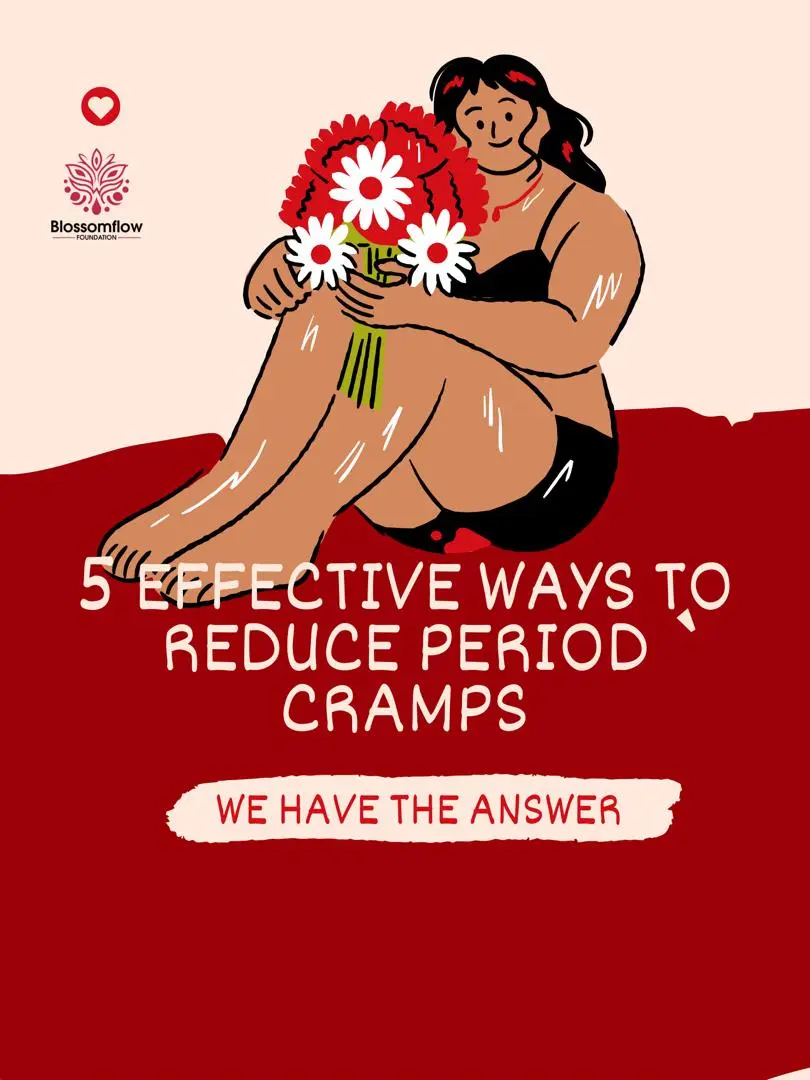
5 Effective Ways to Reduce Period Cramps
Menstrual cramps, also known as “Dysmenorrhea”, are a common and often painful experience for many women. These cramps can disrupt daily activities and affect overall well-being. Fortunately, there are several natural and effective ways to alleviate period pain. In this article, we will explore five proven methods to reduce period cramps and help you find relief.
To reduce period cramps, maintain a Balanced Diet
- Nutrient-Rich Foods
Eating a well-balanced diet can significantly impact menstrual health. Consuming foods rich in calcium, magnesium, and omega-3 fatty acids can help reduce muscle tension and inflammation, which in can reduce period cramps. Include leafy greens, nuts, seeds, and fatty fish like salmon in your meals to support muscle relaxation and lower cramp intensity.
- Avoid Certain Foods
Certain foods can worsen menstrual symptoms. It is advisable to limit the intake of caffeine, sugar, and high-sodium foods, as they can contribute to bloating and discomfort. Reducing these items in your diet, especially before your period starts, can lessen the severity of cramps.
- Hydration
Staying hydrated is essential for reducing period pain. Drinking plenty of water helps prevent bloating and muscle cramps. Aim for at least 8 glasses of water per day. Adding lemon or cucumber slices to your water can make it more refreshing and encourage you to drink more.
Exercise Regularly
- Benefits of Physical Activity
Regular exercise is a powerful tool for managing period pain. Physical activity releases endorphins, which act as natural pain relievers and improve mood. It also enhances blood circulation, helping to reduce period cramps.
- Recommended Exercises
Gentle exercises like walking, stretching, or yoga are especially beneficial during menstruation. Yoga poses such as Child’s Pose, Cat-Cow, and Reclining Twist help relax the lower abdominal muscles and reduce pain. Even a short, 15-minute walk can make a significant difference and help reduce period cramps.
- When to Avoid Exercise
While exercise is generally beneficial, it’s crucial to listen to your body. If cramps are severe, rest and relaxation may be more effective. Gentle stretching or deep breathing exercises can be a good alternative on days when you don’t feel up to more intense activity.
Use Heat Therapy
- Heating Pads
Applying heat to the lower abdomen is one of the simplest and most effective ways to reduce period cramps. Heating pads relax the uterine muscles and increase blood flow, which helps reduce pain. Use a heating pad on your lower abdomen for 15-20 minutes, taking breaks to avoid skin irritation.
- Warm Baths
Soaking in a warm bath can provide relief from cramps and help you relax. Adding Epsom salts to the bath enhances the effect, as the magnesium in Epsom salts is absorbed through the skin, helping to reduce muscle tension and cramping.
- DIY Heat Packs
If you don’t have a heating pad, you can make a DIY heat pack using a sock filled with rice. Heat the rice-filled sock in the microwave for about a minute and apply it to the painful area. This simple homemade solution can be just as effective as commercial heating pads.
Try Herbal Remedies
- Ginger and Chamomile Tea
Herbal teas like ginger and chamomile offer natural relief for menstrual cramps. Ginger has anti-inflammatory properties that can help reduce period cramps, while chamomile relaxes the uterus and soothes nerves. Drinking these teas during your period can alleviate discomfort and promote relaxation.
- Turmeric
Turmeric, known for its anti-inflammatory and antioxidant properties, can help reduce period cramps. Adding turmeric to your meals or consuming it as a tea can support overall menstrual health.
- Fennel Seeds
Fennel seeds have been traditionally used to relieve menstrual discomfort. They contain anethole, a compound that can help reduce uterine spasms and pain. Drinking fennel seed tea or chewing on fennel seeds may provide relief from cramps and bloating.
Over-the-Counter Pain Relief
- NSAIDs (Non-Steroidal Anti-Inflammatory Drugs)
Over-the-counter medications like ibuprofen and naproxen can effectively reduce period cramps. These NSAIDs work by blocking the production of prostaglandins, hormones that cause inflammation and pain. Taking these medications at the onset of cramps can help manage severe pain.
- Antispasmodics
Antispasmodic medications, such as Buscopan, can help alleviate muscle spasms and pain associated with menstrual cramps. These medications work by relaxing the smooth muscles of the uterus.
- When to Consult a Doctor
If over-the-counter medications and natural remedies do not provide sufficient relief, or if your cramps are severe and interfere with daily activities, it’s important to consult a healthcare provider. They can help determine the underlying cause of your pain and recommend appropriate treatments.
Conclusion
Menstrual cramps can be challenging to manage, but with the right approach, it is possible to find relief. By maintaining a balanced diet, exercising regularly, using heat therapy, exploring herbal remedies, and considering over-the-counter pain relief options, you can reduce period cramps and improve your quality of life. Always consult with a healthcare provider for persistent or severe symptoms to ensure you receive the best care.
Read Ultimate Advanced Tips for Beating Period Cramps: From Nutrition to Relaxation to learn more.
All Categories
Recent Posts
Why SDG 4 Cannot Be Achieved Without Ending Period Poverty
Tags
Give them a helping hand
Every donation fuels our mission to combat period poverty. Your generosity brings us closer to menstrual equity.
+234-909-482-1642
inquiries@blossomflow.org




